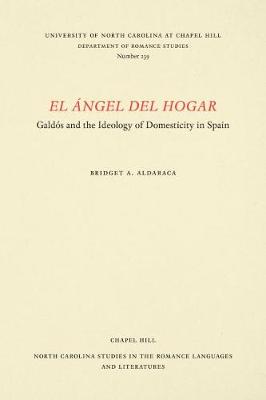North Carolina Studies in the Romance Languages and Literatures
1 total work
Bridget Aldaraca breaks new ground in the study of women, ideology, and the realist novel. Her book explores the ideology of domestic life in Spain as it relates to changing concepts of the family, women's roles in society, the division of social space into private and public spheres, and attitudes toward conspicuous consumption, sexuality, mental illness, and other social themes.
Aldaraca begins by examining texts from the time of the Spanish Counter-Reformation through the Spanish Enlightenment and up to 1900, charting the evolution of women's roles within the institution of the family. She then analyzes the personification of the feminine ideal through the literary creation of ""the angel of the house"" in the novels of the nineteenth-century writer Benito Perez Galdos. Her book will give Anglo-American scholars access to some of the literary and ideological problems currently under discussion within the historical context of nineteenth-century Spain.
Aldaraca begins by examining texts from the time of the Spanish Counter-Reformation through the Spanish Enlightenment and up to 1900, charting the evolution of women's roles within the institution of the family. She then analyzes the personification of the feminine ideal through the literary creation of ""the angel of the house"" in the novels of the nineteenth-century writer Benito Perez Galdos. Her book will give Anglo-American scholars access to some of the literary and ideological problems currently under discussion within the historical context of nineteenth-century Spain.
